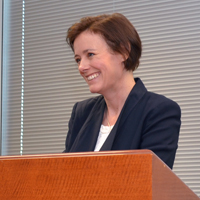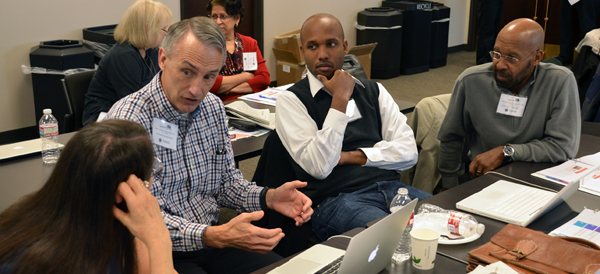Political training
Physicians learn to be effective advocates for profession
Susan Koontz, JD, CMS General Counsel
CMS members, staff and guests gathered on Saturday, Oct. 12, for the 2013 Regional Campaign and Grassroots Seminar, a semi-annual work session on the art of advocacy hosted by the political action committees of the Colorado Medical Society, the American Medical Association and the Colorado Academy of Family Physicians.
Keynote speaker Stephanie Vance, also known as the “Advocacy Guru,” presented the rules of political engagement and lobbying, drawing specific tips and examples from her more than 20 years working in a prominent D.C. law firm, as a lobbyist for National Public Radio and in various congressional offices.
She stressed the importance of political involvement, differentiating between the “grassroots” and the “grasstops.” Those in the grassroots may not have much advocacy training but they serve an important role by communicating with their legislators. Those in the grasstops organize the grassroots and identify the issues that need to be addressed. Together they form an effective advocacy team.

Strategic messaging is crucial, Vance said. “You’re going to want to use words that are going to resonate in the legislative environment. One great way to do this is to ask people in the legislature or state agencies what they think will resonate with their colleagues. This is critical because if you don’t have the messaging you’ll often lose the battle when [an opponent] comes up with the compelling message.”
To be an effective advocate, an organization must understand the makeup of the political body. Vance categorized elected officials into four categories: champions, supporters, neutrals and opponents, advising attendees to focus the bulk of time on neutrals as this group is often undecided because they are not adequately informed of an issue.
Finally, an organization must ensure each goal is “SMART,” an acronym for specific, measurable, attainable, realistic and timely. Using this method, an advocate should know specifically what he or she is asking for, evaluate whether it’s going to be effective, consider the context of the political and fiscal environment and focus on things that are attainable, analyze an organization’s internal resources to gauge what’s realistic, and understand the timeframe to prioritize accordingly.

Jim Wilson, PhD, manager of political education programs for the AMA, spoke about the other side of the “advocacy coin,” fundraising. On one side are the principles Vance outlined: talking to legislators, developing a relationship with them, telling a clear story about how a policy will impact their constituents from your perspective as a care provider. “The flipside of that coin is being in a position to influence who gets elected to those offices in the first place, having a role in deciding who makes the decisions,” he said.
“One of the ways you can be effective at this is to help raise money not only for COMPAC but for candidates who are going to be amenable to you, people who are hopefully going to become champions for you in the statehouse.”
The most important reason people don’t contribute to a PAC or a political campaign is because no one has asked them, Wilson said. He encouraged physicians to consider talking to peers or hosting a fundraising event. “Even small donations add up. If you can create a culture of people getting involved – even at low levels – and you show them the results, you can make an important difference.”
Jeremy Lazarus, MD, immediate past president of the AMA, gave an update on federal issues, chiefly the movement to repeal Medicare’s sustainable growth rate formula and replace it with effective payment reform. Achieving an SGR repeal is more likely than in years past, he said, because of the “bargain-basement price of only $138 billion,” which is about $100 billion less than it has been in recent years. Lazarus also stressed that even if it seems like Congress is idle, the key committees in the Senate and the House are continuing to work on SGR repeal.
“We need all of you to add your voice to this effort,” he said. The AMA launched an effort last month called Fix Medicare Now. The accompanying website, FixMedicareNow.org, houses videos, talking points and other resources physicians and patients can use to reach legislators. “We need to keep up the pressure. As we get closer to the end of the year and as we see a live bill going forward, we’re going to be investing a significant amount of AMA resources in key areas around the country to make sure we get this passed this year.”
Terri Folk, regional political director at the AMA, presented some of the advocacy resources AMA provides and ways to be involved. She encouraged all physicians – even those who aren’t members of the AMA – to join the Physicians’ Grassroots Network to stay informed of the legislative issues important to organized medicine and be able to send customizable e-mails to legislators. Similarly, she asked attendees to encourage patients to join the Patients’ Action Network so they can receive tailored e-mail alerts to engage them on top issues in health care.
The AMA VIP (Very Influential Physicians) grassroots program is a key contacts program that allows physicians to build and leverage the personal or professional contacts they maintain with their elected officials, a legislative staff person or an elected official’s spouse. “There are lots of freshman and sophomores in office right now and we want to be sure we have a physician assigned to each member of Congress to make sure we have someone we can turn to when need arises. When needed, we look at our list of VIPs for a legislator like Congressman Cory Gardner. We would reach out to you specifically to ask you to meet him, call him, contact his staff, help us get a message through,” Folk said.
“Members of Congress see [physicians] as a trusted source on health care,” she continued. “You can tell your stories, you can tell the impact of health care decisions on constituents in their district.”
State Sen. Irene Aguilar, MD, gave an update on her work in the Colorado General Assembly and what to expect next session. She said she came to the Senate to be a patient advocate, and shared a story about a patient who struggled with the cost of routine diabetes treatment. The patient eventually developed renal failure and left her job. Now a beneficiary of Medicaid and Medicare, the system pays $45,000 a year for her dialysis.
“I always bring that story up to legislators to say that we’re going to pay for it, we just decide when. And the later we wait to pay for it, the more it’s going to cost us not only in the direct cost to that patient’s life but in real actual dollars and their ability to continue to be contributing members of society. That is what my real goal is, to get people down to the bottom line and say, ‘look, if we’re going to pay for it anyway, let’s figure out a rational way to do it.’”
Aguilar said the physicians in Colorado have a unique opportunity. “First, there aren’t many state legislatures that have physicians in them. Second, even those that do, there are even fewer who have physicians in leadership.” Aguilar was recently elected assistant majority leader, which puts her in a powerful position to influence her colleagues. She told attendees to consider her to be a resource next session. “You’ll have my ear unless it’s contrary to patients’ interests.”
Vidya Kora, MD, chair of the AMPAC Board of Directors Congressional Review Committee, and John Bender, MD, FAAFP, CMS president, encouraged attendees to join the political action committees of the AMA and CMS. “When we give a PAC check it sends a clear message to the legislator what our concerns are and that’s what makes a PAC effective,” Kora said.
“I came across a statement, ‘If medicine is your profession, politics is your business whether you like it or not,’” he continued. “That’s a fact because so much of what happens in our practices is influenced by legislation passed in our statehouses and in Congress.”
Posted in: Colorado Medicine | Initiatives | Advocacy | AMA

Comments
Please sign in to view or post comments.